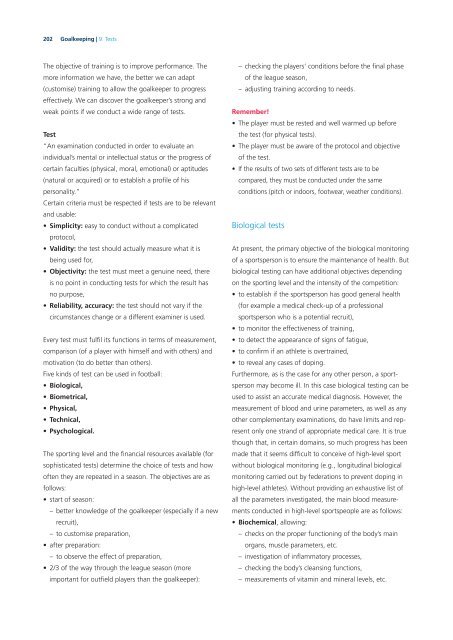Goalkeeping-bok
Goalkeeping-bok
Goalkeeping-bok
You also want an ePaper? Increase the reach of your titles
YUMPU automatically turns print PDFs into web optimized ePapers that Google loves.
202 <strong>Goalkeeping</strong> | 9. Tests<br />
The objective of training is to improve performance. The<br />
more information we have, the better we can adapt<br />
(customise) training to allow the goalkeeper to progress<br />
effectively. We can discover the goalkeeper’s strong and<br />
weak points if we conduct a wide range of tests.<br />
Test<br />
“An examination conducted in order to evaluate an<br />
individual’s mental or intellectual status or the progress of<br />
certain faculties (physical, moral, emotional) or aptitudes<br />
(natural or acquired) or to establish a profi le of his<br />
personality.”<br />
Certain criteria must be respected if tests are to be relevant<br />
and usable:<br />
• Simplicity: easy to conduct without a complicated<br />
protocol,<br />
• Validity: the test should actually measure what it is<br />
being used for,<br />
• Objectivity: the test must meet a genuine need, there<br />
is no point in conducting tests for which the result has<br />
no purpose,<br />
• Reliability, accuracy: the test should not vary if the<br />
circumstances change or a different examiner is used.<br />
Every test must fulfi l its functions in terms of measurement,<br />
comparison (of a player with himself and with others) and<br />
motivation (to do better than others).<br />
Five kinds of test can be used in football:<br />
• Biological,<br />
• Biometrical,<br />
• Physical,<br />
• Technical,<br />
• Psychological.<br />
The sporting level and the fi nancial resources available (for<br />
sophisticated tests) determine the choice of tests and how<br />
often they are repeated in a season. The objectives are as<br />
follows:<br />
• start of season:<br />
– better knowledge of the goalkeeper (especially if a new<br />
recruit),<br />
– to customise preparation,<br />
• after preparation:<br />
– to observe the effect of preparation,<br />
• 2/3 of the way through the league season (more<br />
important for outfi eld players than the goalkeeper):<br />
– checking the players’ conditions before the fi nal phase<br />
of the league season,<br />
– adjusting training according to needs.<br />
Remember!<br />
• The player must be rested and well warmed up before<br />
the test (for physical tests).<br />
• The player must be aware of the protocol and objective<br />
of the test.<br />
• If the results of two sets of different tests are to be<br />
compared, they must be conducted under the same<br />
conditions (pitch or indoors, footwear, weather conditions).<br />
Biological tests<br />
At present, the primary objective of the biological monitoring<br />
of a sportsperson is to ensure the maintenance of health. But<br />
biological testing can have additional objectives depending<br />
on the sporting level and the intensity of the competition:<br />
• to establish if the sportsperson has good general health<br />
(for example a medical check-up of a professional<br />
sportsperson who is a potential recruit),<br />
• to monitor the effectiveness of training,<br />
• to detect the appearance of signs of fatigue,<br />
• to confi rm if an athlete is overtrained,<br />
• to reveal any cases of doping.<br />
Furthermore, as is the case for any other person, a sportsperson<br />
may become ill. In this case biological testing can be<br />
used to assist an accurate medical diagnosis. However, the<br />
measurement of blood and urine parameters, as well as any<br />
other complementary examinations, do have limits and represent<br />
only one strand of appropriate medical care. It is true<br />
though that, in certain domains, so much progress has been<br />
made that it seems diffi cult to conceive of high-level sport<br />
without biological monitoring (e.g., longitudinal biological<br />
monitoring carried out by federations to prevent doping in<br />
high-level athletes). Without providing an exhaustive list of<br />
all the parameters investigated, the main blood measurements<br />
conducted in high-level sportspeople are as follows:<br />
• Biochemical, allowing:<br />
– checks on the proper functioning of the body’s main<br />
organs, muscle parameters, etc.<br />
– investigation of infl ammatory processes,<br />
– checking the body’s cleansing functions,<br />
– measurements of vitamin and mineral levels, etc.


